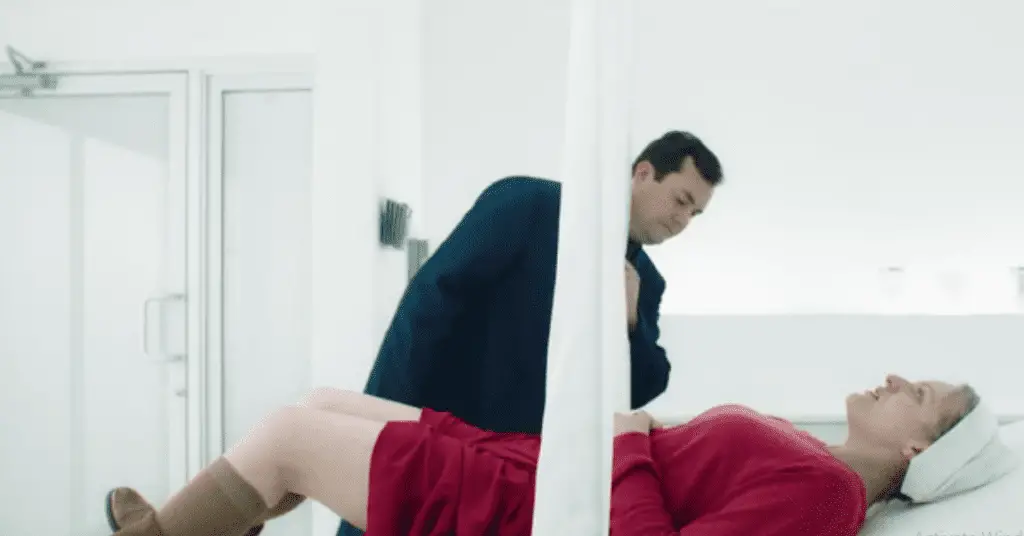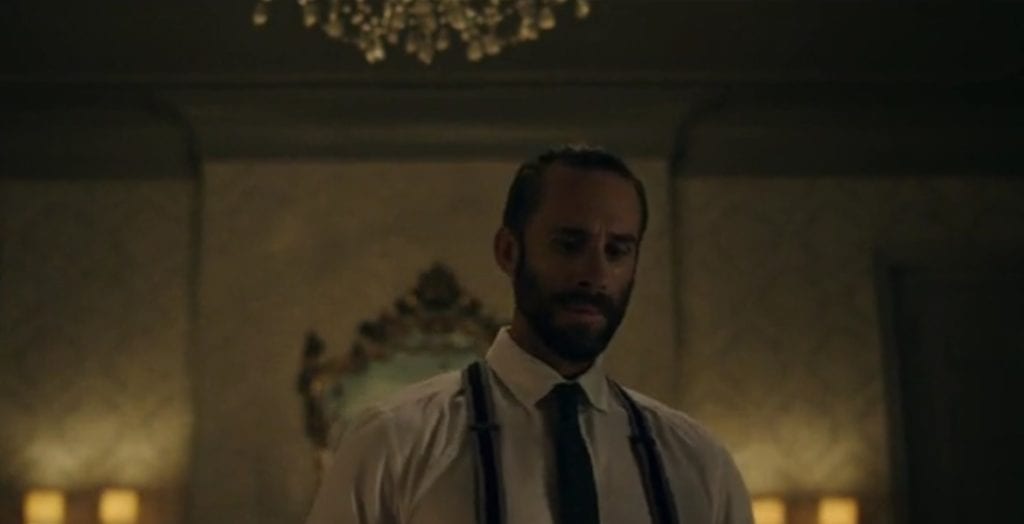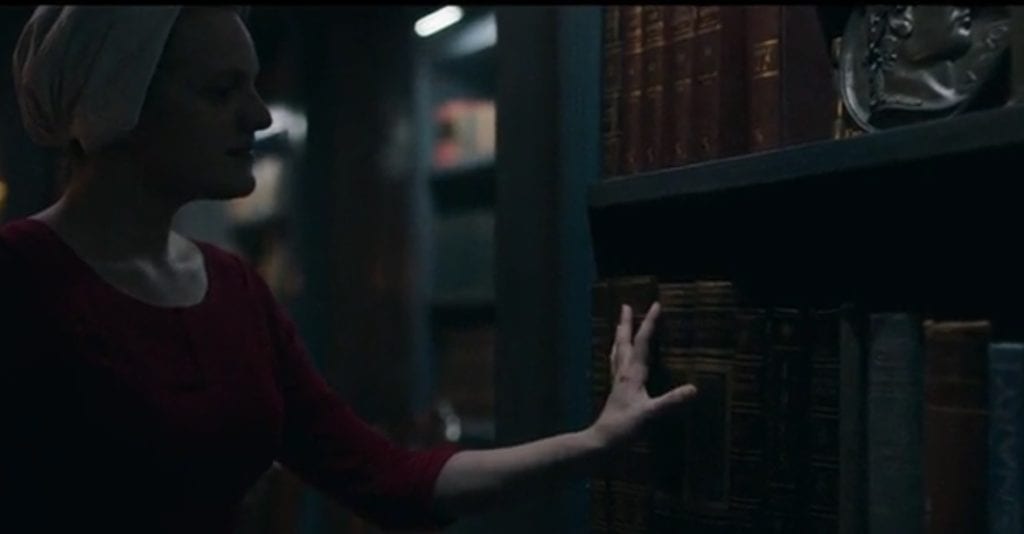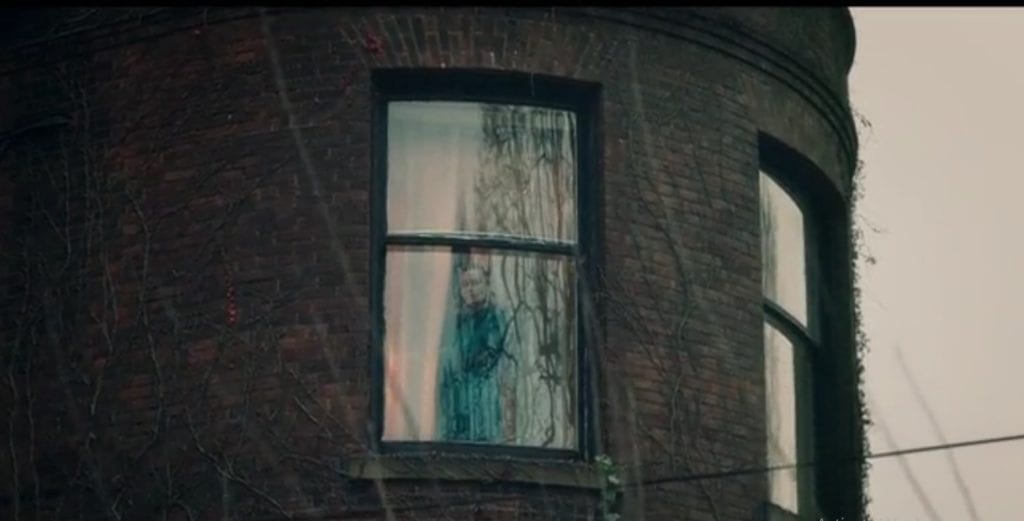The Handmaid’s Tale delivered its fourth episode, “Nolite Te Bastardes Carborundorum.” In it, June finds her inner strength – or even more of it.
Recap
June has been shut up in her room for two weeks, and is getting more and more lost in the memories of her old life. To stop herself from spiralling, she goes to explore her room. In the built-in closet, she finds the words “nolite te bastardes carborundorum” carved into a wall. It’s a little miracle just because it is writing, something June can read – normally, she isn’t allowed. She treats it as a sacred message from the handmaid who was there before.
Rita, the cook/maid of the house, comes into June’s room and finds her lying on the floor. She think June is dead and panics, but June says she fainted. Rita tells the mistress, who then lets a car take June to the doctor.
The doctor – gynaecologist, because apparently there’s only one kind of doctor the handmaids go to – does a check-up and then observes it’s not uncommon to faint before the Ceremony. He further notes that she might never get pregnant by the Commander, since he’s probably sterile. He offers his own services, though. June refuses, saying it’s too dangerous, but thanks him for the offer.

On the way back home, she has a small breakdown in the car while the driver stoically watches her. He then tells her he’s sorry this is happening to her. June goes to her mistress and apologises for her “failing” and begs to be released from her room. The mistress ignores her.
Throughout this, June keeps remembering her and Moira’s escape from the handmaid training centre. They threatened an Aunt with a sharpened metal toilet part, and made her undress. Then they tied her up in a basement and Moira put on her clothes. She then left the centre with June as a handmaid by her side. They walked through town until they came to a metro station. There, Moira tried to find out which train to take to the city. While alone, June was confronted by some soldiers, who soon realised something was wrong with her. So June was dragged away while Moira successfully left for the city. The two exchanged one last, desperate look.
Back in the present, June waits, kneeling, for the ceremony. The commander comes in first, against all rules, to speak with her privately and ask her to his study afterwards. She doesn’t really talk to him.
When it comes to the ceremony, the commander has trouble performing. He retreats to his room to try and work up an erection. His wife comes in after him, offering a blowjob to help him out, but he refuses. The ceremony is called off, with another attempt scheduled a day later.

Later that evening, June comes to play Scrabble with he commander. While getting a dictionary, a treat in itself, she notices a Latin grammar handbook. She asks the commander to translate “nolite te bastardes carborundorum” for her, and he does, explaining that it’s a childish joke and it means “don’t let the bastards grind you down”. He also asks June where she heard this. She says “from a friend”, realising he must have taught it the woman who was posted here before, and asks what happened to her. In wondering about this, she remembers how she herself was beaten after her attempted escape from the centre.
The commander tells June the previous handmaid hanged herself because she found her life unbearable. June realises he wants her life to be bearable, and complains about being confined to her room, implying that it’s impossible to tolerate.
Next, we see her walking out again, with a determined smile, closing the episode with “nolite te bastardes carborundorum, bitches.”
Review
To begin on a positive note, this episode of The Handmaid’s Tale did a great job with displaying June’s hunger for writing, for reading. First we see her trailing the letters the previous handmaid left her in the closet. She doesn’t even understand them, but she realises the importance. It was actually written there. By a handmaid. Just that would make it important, and now she is reading it. That makes it doubly so.
And then we see her desire for books when she is given a glimpse of the feast that is the commander’s library. She is actually even allowed to handle the books, and look into them for a short while. We see her linger every step of the way, knowing that she can’t take too much time but at the same time reluctant to part from this treasure. That is excellently done.

Another thing that deserves praise is the way they showed the power the wives have over handmaids and its limits at the same time. In the book, it’s mentioned that they could do pretty much anything except kill them, but we never really see what this “anything” means in practice. The show has more space, and it’s generally a good thing it uses some of it to illustrate what it actually means. Related to that is also June coming to apologise for her “failing”. It shows her desperation well, and seemed actually closer to the book characterisation of “Offred” than to the fighting spirit of June. But that only makes the scene stronger in some ways, that even she was brought to apologising for not conceiving a child with a sterile man.
I’d also like to particularly praise Joseph Fiennes’ performance this time, as the Commander, and give a shout-out to the parting scene of Moira and June at the metro station. That was one telling look.
As for my complaints, I am getting a feeling that they will be rather repetitive. Once again, I can’t but complain about the conspicuousness of all the rebels here. Moira and June walking away from the centre stuck out like a sore thumb. In the book, when telling this story, Moira specifically emphasises that she had to walk and act like she knew exactly what she was doing and where she was going. Here, she and June both stare at everything around them. Combined with the fact that they gagged the kidnapped Aunt so badly she started to scream for help immediately after they left, they wouldn’t even have made it outside the centre.
I know this probably sounds like nitpicking, but once again, to repeat myself, it downplays the mental violence the regime commits, and also the totalitarian nature of it, where everything just a little out of place – especially when it’s a woman – is checked. The same showed in the random insubordination of one woman in the red centre, and it absolutely showed in June’s conversation with the commander.
In fact, this is what that conversation reminded me of:

June finds out her that the commander wants her to be as happy as possible, or at least less unhappy. That is crucial for her, because it means he wants something depending on her, ergo he has a weakness. She should explore that weakness carefully, Instead, she does the most hamfisted insistence on being released imaginable. It went so far I think it was perhaps meant as irony, as a shared joke between them. But if so, given that it refers back to the death of the previous handmaid, it’s extremely tasteless. She is talking about very real mental issues she has, and because of which her predecessor committed suicide, but does it with all the subtlety and gravitas of Harry Potter threatening the Dursleys with calling Sirius on them in the Goblet of Fire.
Speaking of that death, by the way, the reason given for it here differs from the book one. It might still be revealed later, so I don’t want to spoil it for non-readers, but if they truly changed this, it would also significantly alter the commander’s character. They have already started making him more of a good guy that he is in the book. I really don’t think we need to make the men in this story look like the nice ones, do you? Especially not someone we know is very high up in the regime.
Which brings me to another aspect – the commander’s wife. There is much more animosity between June and her at this point than there ever was in the book. There was also more tenderness last week, of course, so in a way it equals out. And I know I said it was good to see the extent of the wives’ powers.
Still, I’m a little uncomfortable with the choice to particularly pit two women in the house, both sexual abuse victims (though to a different degree, and with different amounts of agency), against each other, making theirs the primary conflict in the household. Especially as it isn’t really compensated by any marginally positive relationship there. June has a much more personal interaction with the maid who finds her on the ground in the book. She has generally a good, though distant, relationship with her. Here, the only person she has is the vague ghost of the previous “Offred”. And, of course, the driver – another man.

The lessening of mental violence was compensated with more physical violence in the previous episodes. Now, we are getting into a bit of a paradox. Because they chose to make June more rebellious, and join in Moira’s escape attempt, by the logic of the universe they had to punish her. But she is the protagonist, so they couldn’t do anything particularly disfiguring. So we end up in a world where Janine gets her eye gouged out for talking back a little, while June gets the soles of her feet beaten for an actual escape attempt that included tasing and threatening an Aunt.
So this inconsistency is one issue, but there is another one, too, with the all-present violence on this show. In the book, it’s never actually described. It’s always stated ex-post what happened. Here, the showrunners insist we have to see. Wouldn’t it be enough to hear the Aunt say “remove her socks” and then see June be dragged into bed with her legs bandaged? No, we get to see her scream as she is beaten. Why? What does this actually give us? Why is it worth it to display this added scene of female suffering?
The violence in the third episode was a different thing. While it was extremely disturbing, all of it gave us new information about the world the story took place in. And it wasn’t overly graphic. But this episode, I am beginning to have my doubts. It feels like the show is trying to compensate its inability to depict subtler violence by more direct scenes of the bodily one, while at the same time having designs on the “dark and gritty” attributes. Personally, I’d much rather do without.
At the same time, I painfully missed Emily, even though her presence would likely have meant more extremely disturbing scenes. For a variety of reason, just one of them being that the acting was incredibly good. The show majorly expanded on her compared to the books. So I sincerely hope this was not actually the last we saw of her. Because while there is certainly value in bringing the violence committed on lgbt* people by this regime into more focus and prominence, ending the story with a horrific act of bodily mutilation and a backyard execution seems not enough. Creating a prominent wlw character only to throw some torture at her and then abandon her would not be a nice story. So I am very much hoping this is not what happened here. She is credited to appear in every episode, which we know already won’t be true, but hopefully it will be all but one.
Overly, this episode left me with mixed feelings. It wasn’t bad, certainly, but there are also some worrying tendencies about the direction this is going, and about some adaptation choices. It’s too early, though, to make a call on that, and there were definitely great moments. Let’s see what next week brings.

